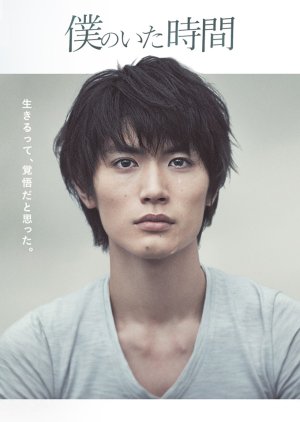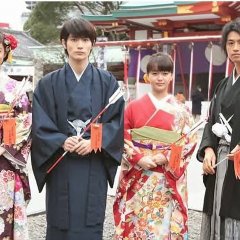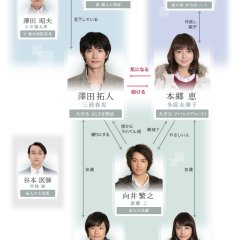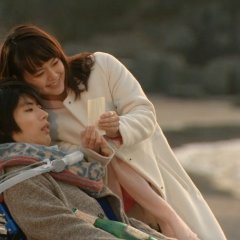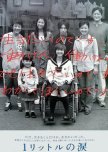 A Brief History of Japanese Dramas
A Brief History of Japanese Dramas - Português (Portugal)
- 中文(简体)
- Русский
- Ελληνικά
- Título original: 僕のいた時間
- Também conhecido como: Time I Was In , The Hours of My Life
- Roteirista: Hashibe Atsuko
- Diretor: Hayama Hiroki, Joho Hidenori, Yasoshima Miyako
- Gêneros: Romance, Vida, Drama, Melodrama
Elenco e Créditos
- Miura Haruma Papel Principal
- Tabe Mikako Papel Principal
- Saito Takumi Papel Secundário
- Kazama ShunsukeMizushima Mamoru [Takuto's close friend]Papel Secundário
- Yamamoto MizukiMurayama Hina [Megumi's close friend]Papel Secundário
- Nomura ShuheiSawada Rikuto [Takuto's younger brother]Papel Secundário
Resenhas

I didn't want to watch this drama because I didn't want of another 1 Litre of Tears.(I loved that drama when I first watched it, but it really serves the purpose of making you cry and I'm kinda sick of the genre right now) But it's alright because this one is completely different.
The story is very realistic and not filled with self-pity. In fact, it's a good thing you see Takuto cry in the opening because he hardly does in the drama ( and the few time he does cry he makes sure you cry with him). I won't say much about the story because I don't want to spoil, but all I can say is : this is not a 1 Litre of Tears copy/paste, so don't worry.
Also, I really like how the characters were written. They all have their importance. Even the school girl, who seems pointless at first, actually have a very important part to play in this story. I even got some good surprises : the little brother, for example. I hated him first, but in the end of the drama he was one of my favorite characters of the show.
Acting : Splendid. Realistic. Impressing. Award worthy. That kind of awesome. And no I don't say that just because Haruma Miura knows how to cry. He knows how to make a character who wants to cry smile and make the audience burst into tears. He knows how to show us that he's scared just by drinking from a bottle. He knows how to forget the camera and his everlasting handsomeness to show us how ugly his face can be when panic burst out. He knows how to control - and loose control- of his voice. Most of all : he can really express lots of emotions just using his eyes, which in this particuar case is a priceless asset.
The supporting actors also did a very good job ( I'm already a fan of Tabe Mikako for Kimi Ni Todoke and Ooku and of Kazama Shunsuke for Soredemo Ikite Yuku - from a psychopath to a cutie pie, is there anything he CAN'T do ?). They all really did a great job.
Music : Not a music to make you cry, more a stressful one. That's what I like. Not self pity, but fear of the life that's coming ahead, that's the point of the drama. But there are also sweet musics for the more positive moments. Anyway the main thing is : the music stayed at its rightful place. Helping the show, not trying to make up for an actor's lack of acting skills. There was no need for that kind of music since all the actors did so well. So as a result, there were lots of silent moments, which made the show even more realistic.
There is only one thing I'd like the point out, about this drama. It's too easy.
After seing the drama, a viewer could feel safe again, knowing that no matter what, there is always a way to cope with the disease. But what you could forget is that Takuto comes from a wealthy family, his father even runs an entire hospital. So all this pieces of equipment - none of them are free, and insurance only covers so much - are there because his family has the money. But surely not all the ALS patients have those kind of means. I'm sure they don't all live in Takuto's luxury. Also, not all the companies would accept to cope with an employee's sickness like that. They don't do a pre-hiring health check-up just for the fun of it. So, sure he has a terrible disease, but in his misery he's terribly lucky. I'm sure a drama about a poor, unemployed man living alone facing the same disease would have been unbearable to watch.
But doesn't keep this drama from being really moving and well done, with outstanding acting. Do watch it ! ^^
Esta resenha foi útil para você?

Boku no Ita Jikan (“The Time I Was In,” internationally titled “The Hours of my Life,”) acquaints viewers with ALS, while painting an intimate portrait of a certain afflicted young man. This drama exults in the ordinary, from sets to characters and even plot points. Yet the propensity toward simplicity is exactly what produces any brilliance it might find. Main character Sawada Takuto could be any 20-something in Japan, but he could just as easily represent any young person anywhere. His goals appear unremarkable, his relationships familiar, his hobbies commonplace. But because they are also realistic, the generated reliability helps to connect viewers to the show. If nothing else, it will leave one questioning themselves. "How have I lived until now? Have I taken my time for granted?"
I would categorize this drama as inspirational, though also quite tragic. Many uplifting moments occur, yet these can be just as painful as the tearjerker scenes. For those wondering, a rather good love story does exist (and with surprising maturity, despite at least one "fish kiss"). There are a few cliches, unfortunately, including the most dreaded irritant: noble idiocy. Veterans of the genre might not enjoy Boku no Ita Jikan as much as others, either; there have been stronger, similar forays, though it brings a youthful flair to the table.
Miura Haruma starred in one of my first experiences with Japanese cinema about a thousand years ago, coincidentally another disease-oriented tale (Koizora). Though I've barely seen him after, I never forgot the effect that initial performance had on me. Meeting Miura-san again in Boku no Ita Jikan, I’m pleasantly surprised at his immense growth from then. His turn as Takuto is delightfully ordinary, yet powerful in its modesty. Most memorable will be his optimistic smile, though there were times I was floored in how deeply I felt Takuto’s fears. An actor with potential indeed.
I found leading lady Tabe Mikako only decent, though she performs well for the most part. Her Megumi takes the longest to “settle” and characterization seems somewhat fluid until around the mid-point. Chemistry with Miura Haruma is consistent, if more strongly felt in later episodes. Saito Takumi looks his best, though character Mukai Shigeyuki possesses a selfish streak. Due to subtle writing and this actor’s innate charm, Shige nevertheless remains painfully human. He might be a flawed jerk in many contexts, but he also has the potential to be genuinely friendly, observant, and likable in others. Nomura Shuhei is also notable, as he develops Rikuto into an surprisingly adorable and complete supporting character.
Pretty music accompanies Boku no Ita Jikan. Of particular note are vocals from Rihwa (“Harukaze/Spring Wind”) and Yuzu (“Yorokobi no Uta/A Song of Joy”). Sound effects are also utilized to a heart-rending degree, including the sound of a ticking clock bridging between scenes.
Esta resenha foi útil para você?

